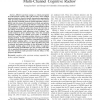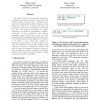35 search results - page 5 / 7 » Learning Interference Strategies in Cognitive ARQ Networks |
126
click to vote
INFOCOM
2011
IEEE
14 years 3 months ago
2011
IEEE
—Cognitive radios (CRs) can mitigate the impending spectrum scarcity problem by utilizing their capability of accessing licensed spectrum bands opportunistically. While most exis...
IAT
2008
IEEE
14 years 11 months ago
2008
IEEE
TD-FALCON (Temporal Difference - Fusion Architecture for Learning, COgnition, and Navigation) is a class of self-organizing neural networks that incorporates Temporal Difference (...
AAAI
1998
15 years 29 days ago
1998
Software agents "living" and acting in a real world software environment, such as an operating system, a network, or a database system, can carry out many tasks for huma...
112
click to vote
TSP
2010
14 years 6 months ago
2010
Effective spectrum sensing is a critical prerequisite for multi-channel cognitive radio (CR) networks, where multiple spectrum bands are sensed to identify transmission opportuniti...
ICSE
2007
IEEE-ACM
15 years 11 months ago
2007
IEEE-ACM
The usability of APIs is increasingly important to programmer productivity. Based on experience with usability studies of specific APIs, techniques were explored for studying the ...


